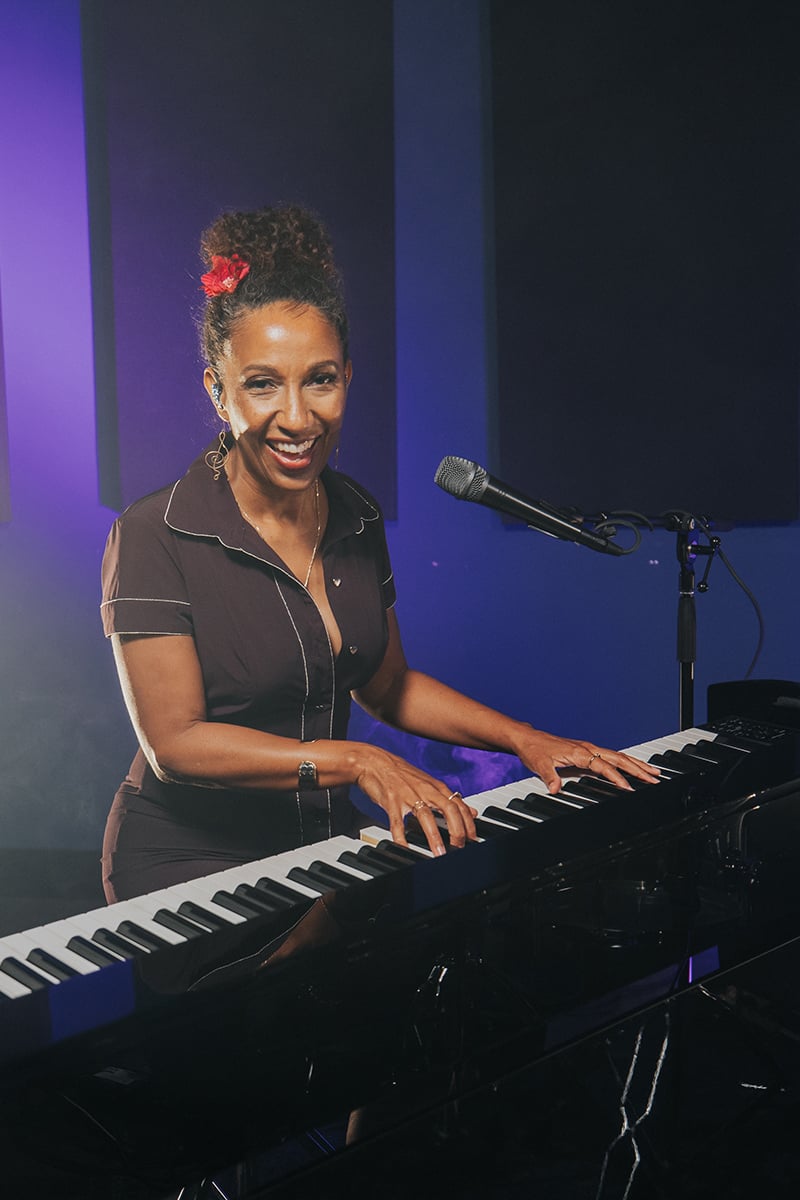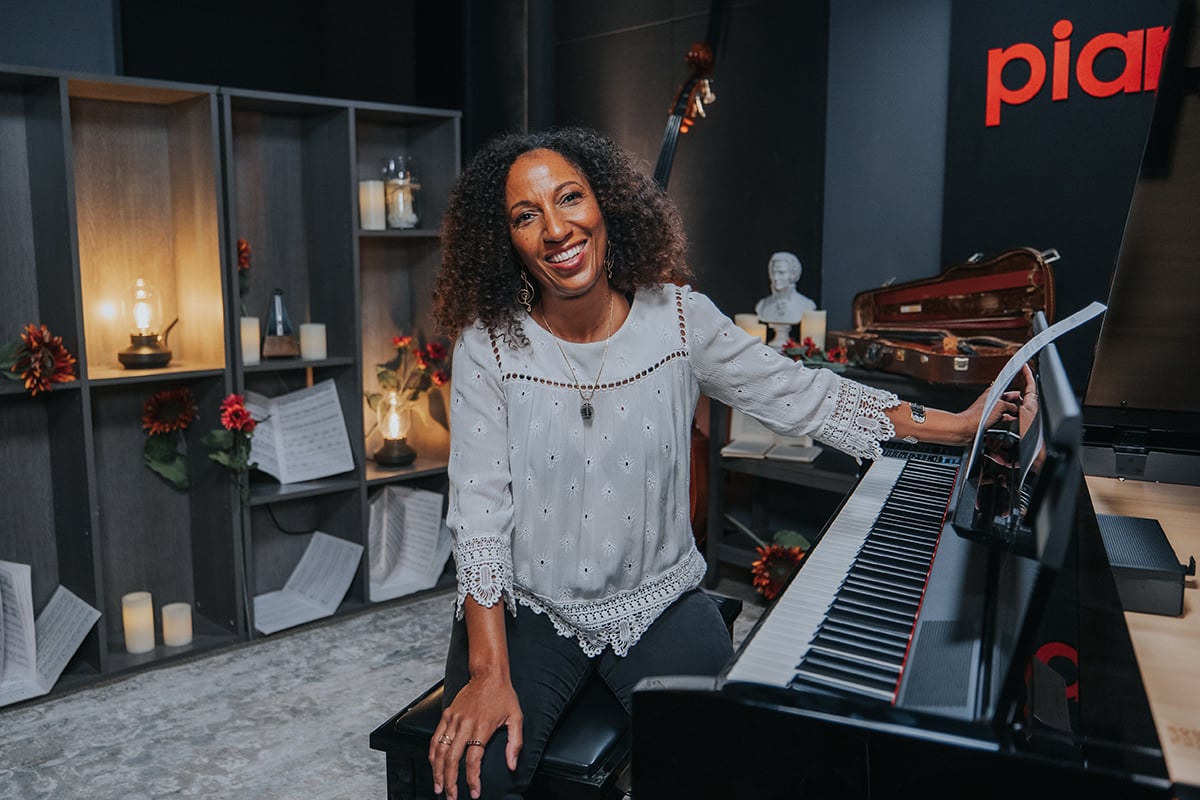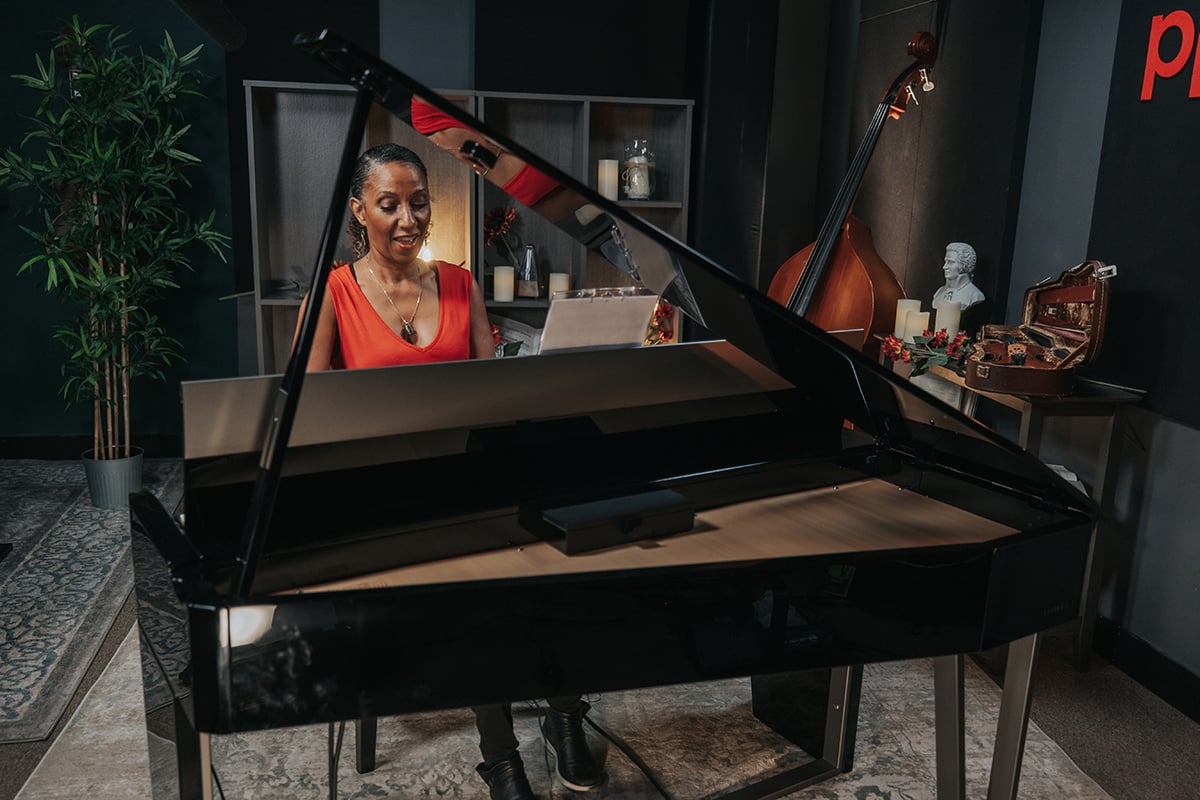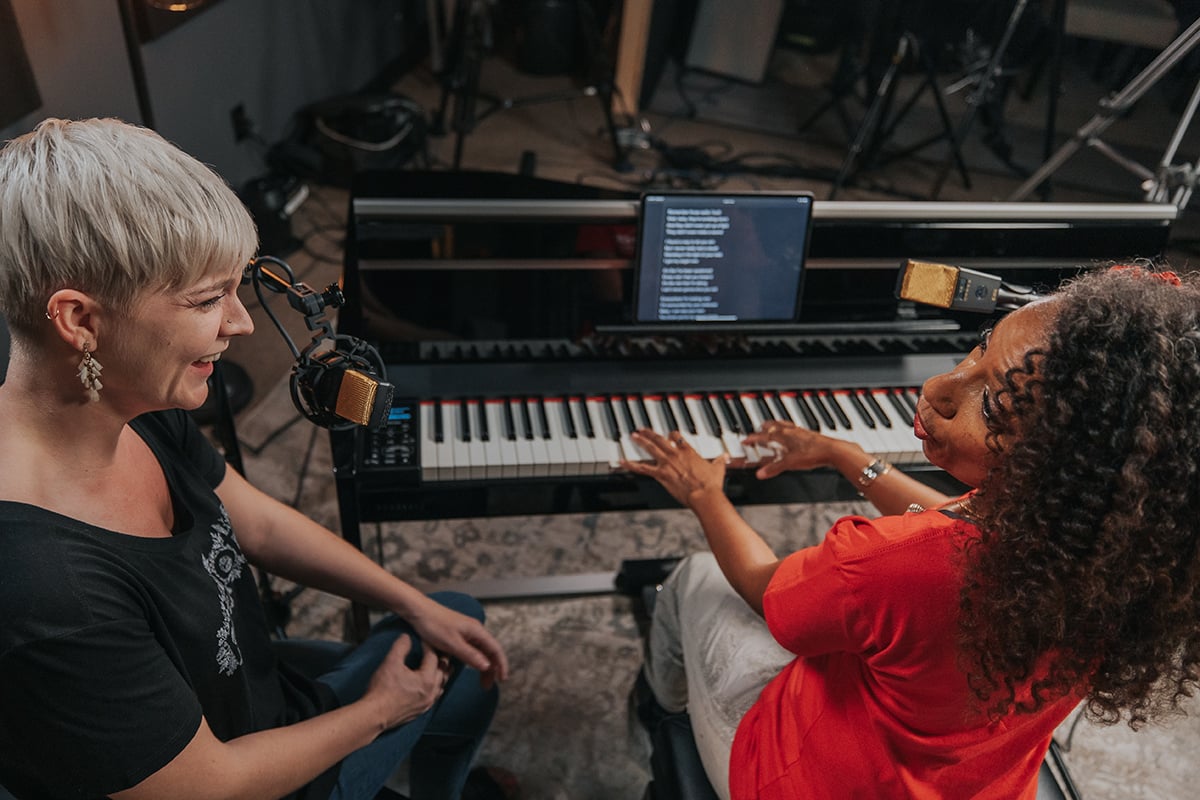If you haven’t heard of Victoria Theodore, you will soon!
The world-class pianist, who has shared the stage with Stevie Wonder and Beyoncé, will be teaching our long-awaited classical piano learning path.
Victoria has had an intense time of filming lessons (like this) with us, but we’re SUPER excited and fortunate to have her join us on this episode of the Pianote podcast.
Victoria has accomplished so much (as a performer, as a composer, and even as a computer scientist) and her secret? Well, it’s practice…and loving it.
How can someone love practicing?! Read on and find out!
Get exclusive access to world-class pianists and what makes them tick. Subscribe to The Note today.
In some ways, Victoria Theodore’s story is what happens when you take a natural inclination for music and combine it with a robust work ethic that’s grounded in passion, not rote learning.
“I don’t remember not playing piano,” says Victoria. Her mother tells a story of her being obsessed with a toy piano from age two. Victoria also came from a musical family; her father — a computer engineer — was an amateur pianist, drummer, singer, and composer.
Victoria would recreate theme songs and commercial jingles she heard on TV. But she didn’t get formal piano lessons until she was twelve years old.
How she got started with formal lessons is a fascinating story. Victoria’s cousin was the one taking lessons, but she didn’t like it (she preferred singing). And when her cousin left her piano books on the piano, Victoria would come along and look through them. She learned how to read sheet music this way, which got the attention of her grandfather, who quickly enrolled her in lessons.

It so happened that Victoria’s grandparents lived next to Laura Tomb Scott, one of the first African-American piano teachers in the San Francisco Bay Area. She had taught Victoria’s father when he was a kid and was already in her 80s when Victoria became her student.
Try to use [practice] as a tool to understand and to develop your muscles, not just because someone tells you to do it.
Victoria Theodore
From her first lesson, Victoria fell in love with “gorgeous” classical music.
Piano was a constant throughout Victoria’s school years. In fact, she practiced so much that the adults in her life had to remind her to stop and go to bed! By the time she was studying at the Oberlin Conservatory, Victoria was practicing 7-8 hours a day on top of her schoolwork.

So how did she do it? Doesn’t practice, well…suck? Victoria doesn’t think so. She has always loved practicing and she has always had a passion for the piano. There was a point when she had to choose between pursuing dance or piano. Victoria chose piano, but she still gets a good dance in, and being embodied in music is a big part of her ethos.
The second thing that helped was having good mentors. Victoria credits her work ethic to teachers who explained to her that practice wasn’t about mindlessly forcing yourself to do something over and over. Instead, practice time is an opportunity to connect with and understand the music better. And like an athlete training for the Olympics, practice also lets Victoria embody herself in the music and develop muscle memory.
If it’s classical or pop it doesn’t matter I’m gonna be groovin’!
Victoria Theodore
Finally, Victoria has an uncanny ability to stay zen when she makes a mistake at the piano. She credits her yoga and meditation practice for this, which has taught her the value of “going interior.” All she does is take a breath and allow her mind to clear.

This isn’t always easy, but she recalls hearing the advice of a monk who likened moments of interiority to passing clouds. Good clouds and bad clouds come and go, but you don’t judge them. Just let them float by. Victoria finds this helps her as a “recovering perfectionist” to “get past errors and get right into expression.”
When it comes to zen, Victoria is inspired by master pianists like Arthur Rubenstein and Martha Argerich who can sit at a piano “like they’re sitting at a lunch table just talking to a friend.” That’s the result of practice, she says, and that’s her goal.
Victoria didn’t start her music career right after school. In fact, there were 7.5 years where she didn’t play piano in public at all.
With a dad who worked at IBM, computer programming had been a significant part of her life since she was eleven. So, although she studied piano, music, and computer music in university, Victoria worked for several years as an engineer at Apple and as a computer consultant and database designer in New York City.
Victoria initially chose a career in computers because making ends meet as a musician is difficult. But working tech made her “miserable” and “fully depressed.”
So she shipped her piano from California to New York. Then, after falling in love with music for a second time, she decided to pursue it full-time and moved back to California.
In California, people still remembered Victoria from her child prodigy days. She busied herself by teaching forty students and taking gigs with orchestras, theatre companies, jazz clubs, schools, and churches. A skilled pianist who was the “local mercenary musician,” she even became an emergency pianist of sorts, filling in for other pianists at a moment’s notice because she can sight-read so well.
A few years after moving back to California, Victoria got a big break touring with Stevie Wonder and toured with the legend for 7.5 years. She recalls Stevie as having a “stunning” and “out of this world” work ethic despite his success. He brings a keyboard everywhere and every day, she says, and no matter what, he’ll practice playing and singing.
After touring with Stevie Wonder, Victoria’s career kept shooting up. She played for the 2013 revival of the Arsenio Hall Show, which unfortunately got cancelled after eight months. Still, this was an opportunity for her to play with more big names and totally fangirl over Prince.
Then, Victoria toured with Beyoncé, whom she describes as “superlative” with a “dedication to excellence.”

Victoria has since been music director for a Donna Summers musical. She also played keyboard for Lin-Manual Miranda’s directorial debut Tick, Tick…Boom!
In her free time, Victoria is writing a musical about Marian Anderson, another one of her heroes and the first Black woman to sing opera at the Met. She also has a band (EnSpirits) with Dave Tweedy, playing a mish-mash genre she describes as “alternative RnB jazz.”
Indeed, genre is not a factor for Victoria. She’s versatile, loves all colors of music, and can dance to anything (even classical!).
People tell me all the time, “You’re so happy, you’re so happy!” That’s cultivated. It’s a choice that I make to pursue that satisfaction and joy in who I am and where I am regardless.
Victoria Theodore with yamaha
Not everyone can or should pursue music professionally. But that doesn’t mean amateur musicians can’t get the full benefits of playing. “Music there for everyone to enjoy,” says Victoria, “and it doesn’t matter if you’re at a beginner level or at an advanced level.”
Victoria’s advice is to “just try it every day, even if it’s five minutes” because “even five minutes is going to give you something. And don’t put any pressure on yourself; just enjoy it.”
Oh, and make sure to dance.
Lisa Witt has been teaching piano for more than 20 years and in that time has helped hundreds of students learn to play the songs they love. Lisa received classical piano training through the Royal Conservatory of Music, but she has since embraced popular music and playing by ear in order to accompany herself and others. Learn more about Lisa.
/marketing/pianote/lead-gen/getting-started/coach.webp)
/marketing/pianote/lead-gen/getting-started/logo.webp)
By signing up you’ll also receive our ongoing free lessons and special offers. Don’t worry, we value your privacy and you can unsubscribe at any time.
We use cookies for traffic data and advertising. Cookie Policy »